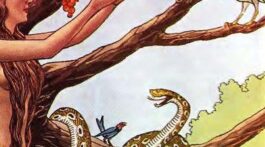Sabbath School Lesson for February 24-March 1, 2024
Overview of Lesson 9, Blessed Is He Who Comes in the Name of the Lord
Memory Text: “The stone which the builders rejected has become the chief cornerstone. This was the Lord’s doing; it is marvelous in our eyes.” Psalm 118:22, 23 NKJV
In the book of Psalms, there are many chapters and verses that help us identify the promised Messiah, known as the Chief Cornerstone of God’s church. Just as Christ is found throughout the Bible, He’s a central figure in the Psalms as well. His identity, the nature of His ministry on earth, His sacrificial death and amazing resurrection, and His role as our Intercessor and Judge in the courts above, are all predicted by the psalmists, speaking centuries before the birth of Jesus.
Some psalms help us see Christ as the supreme King and Judge (Psalms 24, 45, 72, and 101). And others share with us the priestly prayers and suffering He endured here on earth, such as in Psalms 88 and 102.
It’s always good to meditate on the Messiah, Savior of the world. He plays a pivotal role in our salvation, making us want to know as much about Him as we can. The Psalms are a valuable guide and resource in understanding God’s dear Son and what He endured for us.
- Sunday: Divine Self-Sacrificing Shepherd–What makes Him the “Good Shepherd” and not just a hireling? (Ps. 23)
- Monday: The Suffering Messiah–Why did He suffer so much on earth? (Ps. 22)
- Tuesday: Forever Faithful to His Covenant–How has God been faithful to us, and how are we unfaithful to Him? (Ps. 89)
- Wednesday: Eternal King of Unrivaled Power–Why is He seen as a victorious King? (Ps. 2)
- Thursday: Eternal Priest in the Order of Melchizedek–What kind of Priest is He? (Ps. 110)
Sunday: Divine Self-Sacrificing Shepherd (Ps. 23)
Until Jesus came to earth, the imagery of a shepherd as being a type of the Messiah was only partially seen and understood. The kings and prophets, who cared for the people as their shepherds, were inadequate representations of the Good Shepherd. Being human, they often failed in their responsibility to care for the people (2 Samuel 5:2).
Jesus clarified His enhanced role as Shepherd by contrasting His pastoral duties with those who were hired by the owner, known as hirelings. Their connection with the sheep was not as strong as that of the Owner, who had a much deeper care for the sheep, even preferring to die than neglect or lose one of them. And Jesus, also called the sacrificial Lamb of God, ultimately did die for us (John 1:29), showing that He was both divine and human in nature–both Shepherd and Lamb.
In John 10, Jesus explained the role of the Good Shepherd very well. We also see that role described beautifully in Psalm 23. Our total dependence on Him is seen clearly in this psalm. He is not just a shepherd, but the Good Shepherd–above all the rest. He cares for ALL our needs.
Bible Verses:
- Psalm 23, Psalm 28:9, 78:52, 79:13, 80:1, and 100:3
Why is the Messiah thought of as the Good Shepherd, and not just a hireling?
- John 10:11-16 and John 1:29
Why was Jesus both the Shepherd and the Lamb of God? What might being both divine and human have to do with Him having these roles?
Monday: The Suffering Messiah (Ps. 22)
Although several psalms speak of suffering and pain (Psalm 42, 88, and 102), none of them point to the actual events in the life of the Messiah as it is found in Psalm 22. We hear in this Psalm the words of the mocking crowds that surrounded Jesus on the cross (Psalm 22:7, 8), and also His own words (Psalm 22:1), as He was dying in front of those who had treated Him so brutally. Piercing His hands and feet (Psalm 22:16) and dividing His garments and casting lots for them (Psalm 22:18) are all predicted in Psalm 22.
The mental anguish of Jesus on the cross must have been the hardest to endure. He was not suffering for His own sin, as He had none, but was bearing the guilt of all the sins ever committed by mankind. No wonder He felt forsaken by His Father. And yet God was there in the earthquake and darkness that surrounded Him, later orchestrating His resurrection, and finally uplifting Him to the position of being our victorious King and High Priest.
Despite the rejection and hate He experienced on earth, God has glorified His Son’s sacrifice, making Him the chief cornerstone of His holy temple (Ephesians 2:20-22 and 1 Peter 2:4-8).
Bible Verses:
- Psalm 22:1, Matthew 27:46, John 1:1, 2, and 10:30
How do we know God had not forsaken His Son?
- Psalm 22:7, 8 and Matthew 27:43
In what way was Jesus tempted by the mocking crowd?
- Psalm 22:18 and Matthew 27:35
Why was it significant that they divided His garments and cast lots for them? What does this tell us?
Tuesday: Forever Faithful in His Covenant (Ps. 89)
From time to time, God has made covenant promises, all pertaining to how He would redeem men and women from their fallen, sinful state. Adam, Noah, Abraham, Jacob, and David–all of them were given messages of hope that helped them through their times of suffering. And all of these promises pointed in some way to the coming Messiah, who would also suffer.
Although specifically mentioning the covenant made to David, Psalm 89 gives all of us glimpses into the life of the One who would come to this world as our Savior. Notice in Psalm 89:9, for example, it mentions One who would still the waves of the raging sea. See also Psalm 65:7 and 107:29. This event had its fulfillment in the life of Jesus when He rebuked the winds and waves and saved the disciples’ boat from sinking (Matthew 3:23-27). The disciple John recognized the Messiah as the Creator (John 1:3), no doubt partially from witnessing such a miracle as this. His creatorship is also mentioned in Psalm 89:11, and by other psalmists.
Psalm 89 reminds us of God’s faithfulness in keeping His covenant. It also includes our lack of faithfulness in keeping the promises we have made to Him. Despite our times of wavering loyalty, God is faithful in receiving us when we repent and turn back to the relationship with Him we need for victory over sin.
Bible Verses:
- Psalm 89:1-4 and Matthew 1:1
Why was David’s seed mentioned in God’s covenant to him? How was this promise fulfilled?
- Psalm 89:27-32 and Colossians 1:16, 20-22
What is meant by being the “firstborn”? (David wasn’t the first born in his family.)
- Psalm 89:38-46, and 132:10-12
What kind of events would threaten the Davidic covenant?
Wednesday: Eternal King of Unrivaled Power (Ps. 2)
We have been given a picture of the Messiah as the gentle, good Shepherd, who despite His suffering, remains faithful to the “sheep of His pasture”. But another image of Him emerges in Psalm 2. Here, we are introduced to a powerful, eternal King, who will defeat His enemies and rule with a rod of iron (Psalm 2:8, 9 and 110:1, 2).
In order to have peace and confidence in our relationship with God, we must see Him as having both love and justice. He must be the One who loves all who call on His name, but also the One who routes out our enemies when they fail to repent.
Therefore, the rod of the Shepherd can be seen as a way to guide the sheep, pulling them out of a ditch when needed, but can also serve as a weapon to beat off a predator that threatens the flock–a symbol of both everlasting love and divine judgment.
Bible Verses:
- Psalm 2 and Psalm 110:1-3
Why is it important for us to know the unrivaled power of God’s Son, as well as His tender love?
Thursday: Eternal Priest in the Order of Melchizedek (Ps. 110)
We find a unique combination of Christ as both King and Priest in Psalm 110, said to be the most-quoted chapter in the New Testament. He is called an eternal priest after the order of Melchizedek (Psalm 110:4). Melchizedek was not from the tribe of Levi, as we might expect. And yet, he served as priest and king of Salem (which later became Jerusalem), blessing Abraham and then receiving tithe from him (Genesis 14:18-20).
Hebrews 7:20-28 enlightens us as to why the Messiah is linked to this ancient king and priest Melchizedek. Even with this connection, however, we are shown differences. Unlike any earthly priest, including Melchizedek, God’s Son never sinned, never changes, and still lives to be our High Priest.
Bible Verses:
- Psalm 110
What hope do we find in Christ being both our King and Priest?
Why do you think this combination works so poorly in our world of sin? In other words, why is linking government and religious authorities together not a good idea? What does it lead to?
- Hebrews 7:20-28
What makes Christ’s priesthood superior to earthly ones?
Friday: Final Thoughts
Authors of the New Testament were enthralled with the book of Psalms. Some Bible scholars assert that it was probably their favorite book in the Scriptures. It was often quoted or alluded to in their own writings, providing us with a unique understanding of the identity of “God with us”, Immanuel. We see Christ fully in the Psalms and the New Testament–He is the Son of David, the Good Shepherd, the Lamb of God, our eternal King and High Priest.
Ellen G. White poetically explained the concept of “God with us” in The Desire of Ages, p. 24…
“By His humanity, Christ touched humanity; by His divinity, He lays hold upon the throne of God. As the Son of man, He gave us an example of obedience; as the Son of God, He gives us power to obey.”
These hymns are just a few that highlight everything Jesus means to us…
- “Fairest Lord Jesus”, #240
- “More About Jesus”, #245
- “Praise Him! Praise Him!”, #249
Next Week: Lessons of the Past
To read the Sabbath School Lesson Quarterly and see more resources for its study, go to










